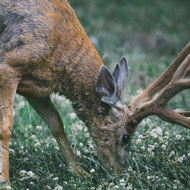
Disease comparable to BSE in cattle
A fatal condition comparable to bovine spongiform encephalopathy (BSE) in cattle is spreading through deer in the United States.
Chronic Wasting Disease (CWD) has so far been identified in 25 states. Most cases have been identified in the Midwest and Rocky Mountains, but some have been confirmed as far east as New York.
Speaking to United Press International, Lou Cornicelli from the Minnesota Division of Fish and Wildlife said: “States are in all various stages of infection.
“We try to contain it, but it is tough to categorise if you’re being successful. Mostly it’s just trying to limit its spread.”
CWD is a neurological condition that affects deer, moose and elk. It causes spongy degeneration of the brains of infected animals, leading to emaciation, disorientation and death.
While It is not yet known how CWD spreads, researchers believe the agent may pass through the bodily fluids of infected animals.
CWD is included in a group diseases known as transmissible spongiform encephalopathies (TSEs) or prion diseases. Inside this group are other variants that affect domestic animals, including bovine spongiform encephalopathy (BSE) in cattle and scrapie in domestic sheep.
It is this link to BSE that has sparked fears that CWD could become transmissible to humans.
While there have been no confirmed cases of this happening, there is evidence to indicate it might be possible. Two years ago, researchers in Canada were able to infect macaque monkeys - our closest relative - with CWD by feeding them infected deer meat.
As a precautionary measure, health and wildlife officials have encouraged hunters not to eat meat from infected animals and to take common sense precautions when harvesting deer or elk from infected areas.
Culling is currently the only way to kill the infected animals. Minnesota is culling hundreds of deer in areas where the disease has been identified and Illinois is holding a special deer season in infected zones.
“We’ve been really aggressive,” Cornicelli told UPI. “But we still don’t know what the next five years will bring.”



 RCVS Knowledge has welcomed Professor Peter Cockcroft as editor-in-chief for Veterinary Evidence.
RCVS Knowledge has welcomed Professor Peter Cockcroft as editor-in-chief for Veterinary Evidence.